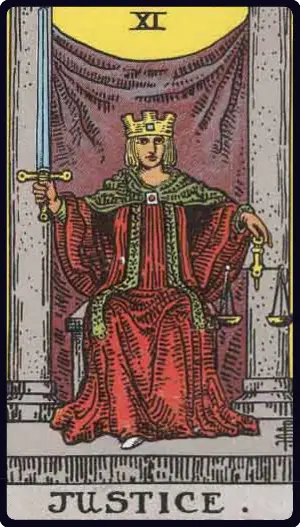


When it comes to the realm of finances, the concept of justice plays a crucial role in shaping our financial well-being. In the world of Tarot, the Justice card carries significant symbolism and offers insights into the balance, fairness, and ethical decision-making that are integral to our financial lives. In this article, we will explore the meanings and interpretations of the Justice card in the context of finances, and how it can guide us in making sound financial choices.
The Justice card is a powerful archetype in the Tarot deck, often depicted with a figure holding a sword and scales, representing fairness, truth, and the weighing of options. In the context of finances, the Justice card signifies the importance of making decisions based on reason, accountability, and integrity. It encourages individuals to take responsibility for their financial actions and to seek equilibrium in their monetary dealings.

When faced with financial dilemmas, the Justice card reminds us to approach our decisions with a sense of balance and fairness. It urges us to consider the long-term consequences of our choices and to strive for equitable outcomes. Whether it involves budgeting, investments, or debt management, the Justice card encourages us to seek harmony and equity in our financial endeavors.
Integrity is a fundamental aspect of the Justice card, and it holds great significance in the realm of finances. This archetype calls for honesty, transparency, and ethical conduct in all financial matters. Whether dealing with business transactions, taxation, or personal finances, the Justice card serves as a reminder to uphold moral and ethical standards in our financial dealings, fostering trust and integrity within the financial domain.
One of the key lessons of the Justice card in the context of finances is the importance of accountability and taking ownership of our financial decisions. It prompts individuals to assess their financial responsibilities, make informed choices, and be accountable for the consequences of their actions. Whether it involves managing debts, honoring financial commitments, or exercising prudence in spending, the Justice card emphasizes the need for accountability and responsible financial behavior.
Financial interactions with others often require a sense of fairness and equitable treatment. The Justice card encourages individuals to seek fairness and balance in their financial relationships, whether it pertains to business partnerships, joint ventures, or shared financial responsibilities. It reminds us to uphold fairness and equity in our dealings with others, fostering trust and harmony in financial collaborations.
Every financial decision carries its own set of consequences, and the Justice card prompts individuals to evaluate the potential outcomes of their choices. It encourages a thoughtful and deliberate approach to financial decision-making, considering the ethical, moral, and long-term implications of each choice. By weighing the options and considering the broader impact of financial decisions, individuals can align their choices with fairness and integrity.
At times, individuals may find themselves facing financial imbalances or injustices, whether due to unforeseen circumstances, economic challenges, or unfair practices. The Justice card offers guidance in restoring financial equilibrium, advocating for actions that rectify imbalances and promote fairness. It encourages individuals to seek redress, make amends, and take steps to realign their financial circumstances with fairness and integrity.
The Justice card serves as a powerful symbol of fairness, balance, and ethical conduct in the realm of finances. Its teachings remind us of the importance of making sound, equitable financial choices, upholding integrity, and seeking fairness in all financial matters. By embracing the wisdom of the Justice card, individuals can navigate their financial journeys with a sense of ethical responsibility, accountability, and a commitment to financial equilibrium.
Have questions or need guidance? Reach out to us anytime at [email protected]
We're here to help you on your tarot journey.
© Copyright 2024 by TarotKeeper.com. All rights Reserved.